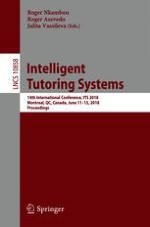2018 | OriginalPaper | Chapter
Changes in Emotion and Their Relationship with Learning Gains in the Context of MetaTutor
Authors : Jeanne Sinclair, Eunice Eunhee Jang, Roger Azevedo, Clarissa Lau, Michelle Taub, Nicholas V. Mudrick
Published in: Intelligent Tutoring Systems
Publisher: Springer International Publishing
Activate our intelligent search to find suitable subject content or patents.
Select sections of text to find matching patents with Artificial Intelligence. powered by
Select sections of text to find additional relevant content using AI-assisted search. powered by
